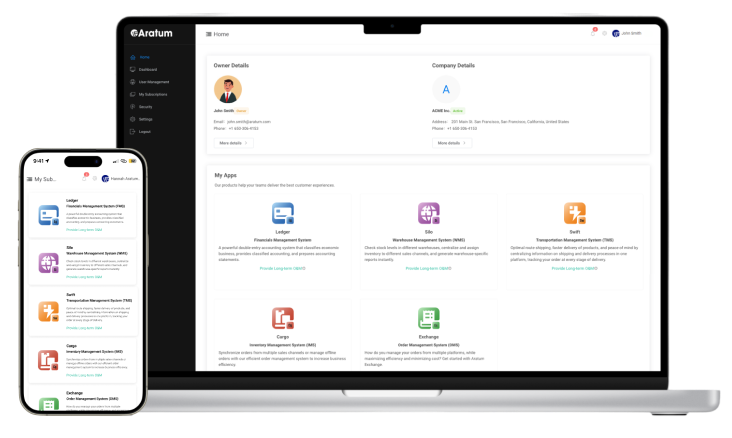As technology advances, processes grow in complexity, amplifying security risks. Thus, maintaining up-to-date IT infrastructure is imperative for companies.
Aratum’s Hybrid cloud computing systems offer a resilient and cutting-edge system. The infrastructure safeguards your data and adapts to workloads, paving the way for seamless company growth.
SKALABILITAS
Flexibility
Data Security
High Availability
Disaster Recovery
Integration Capabilities
Real-time Data Processing
Cost Optimization
Collaboration Tools
Innovation and Future-Proofing:
Hybrid cloud computing allows supply chain businesses to scale their web applications and services dynamically based on demand fluctuations, ensuring optimal performance during peak periods without over-provisioning resources.

Machine Learning is a deep learning infrastructure that develops algorithms and models that allow computers to learn from and make predictions or decisions based on data without being explicitly programmed for each task. As its name suggests, the machine learns independently based on the data it gathers.

Provide robust security measures to protect sensitive supply chain data, including encryption, access controls, and threat detection mechanisms, ensuring compliance with industry regulations and standards.

By distributing workloads across multiple cloud environments and data centers, Hybrid cloud computing enhances availability and resilience, minimizing the risk of downtime and ensuring continuous operation of critical supply chain processes.

Enable supply chain businesses to implement comprehensive disaster recovery strategies by replicating data and applications across geographically dispersed environments, ensuring rapid recovery during outages or disasters.

Facilitate seamless integration with existing supply chain systems and applications, allowing for smooth migration and interoperability between on-premises and cloud-based environments.

Supply chain companies can leverage edge computing capabilities to process and analyze data closer to the source, enabling real-time insights and decision-making to optimize operations and logistics.

Cost-effective solutions for supply chain businesses allow you to balance cost and performance requirements, optimize resource usage, and leverage pay-as-you-go pricing models offered by public cloud providers.

Hybrid cloud computing provides features that enable seamless communication and information sharing among supply chain partners, fostering collaboration and coordination across distributed teams and stakeholders.

By embracing Hybrid cloud computing, supply chain businesses can stay ahead of the curve and future-proof their infrastructure against emerging technologies and market trends, enabling agility and adaptability to changing business needs.


Hybrid cloud solutions provide secure patient data storage, enable provider collaboration, support medical research, ensure regulatory compliance, streamline administrative processes, offer scalable infrastructure for data analytics, and enhance disaster recovery planning.

Hybrid cloud solutions support omnichannel operations, integrate sales channels, optimize inventory, personalize marketing, ensure data security, enable scalable e-commerce platforms, enhance customer experiences, streamline logistics, and accommodate seasonal demand

Hybrid cloud computing ensures secure storage of R&D data in private clouds, accelerates drug discovery with public cloud resources, optimizes supply chains, ensures compliance, fosters collaboration, and offers a scalable analytics and disaster recovery infrastructure.

Hybrid cloud computing offers scalable infrastructure, ensures high availability, enables global reach, secures customer data, integrates omnichannel experiences, leverages data analytics, and implements robust disaster recovery for business continuity.

In transportation and logistics, hybrid cloud solutions optimize route planning, provide real-time visibility, enable efficient inventory management, support forecasting, enhance customer service, ensure regulatory compliance, streamline customs clearance, and improve overall logistics efficiency.
In the cold chain industry, hybrid cloud solutions enable real-time temperature monitoring, ensure regulatory compliance, optimize logistics, enhance product quality and safety, provide visibility, support predictive maintenance, and foster stakeholder collaboration.
AI automates trading processes, detects fraud, and provides personalized financial services through machine learning algorithms, natural language processing, and predictive analytics.
Hybrid cloud technology enables governments to secure classified data storage, deliver citizen-facing services, plan for disasters, and drive digital transformation. It ensures efficient service delivery, enhances data security, and fosters innovation in public sector operations.
Use Case
Hybrid cloud computing enables smart factory initiatives by connecting equipment, optimizing processes, improving efficiency, enabling real-time analytics for maintenance and quality control, ensuring IP protection, supporting supply chain integration, and enhancing collaboration for innovation.
Hybrid cloud computing provides scalable SOCs for threat detection, leverages analytics and machine learning for proactive security, ensures secure data storage, enables compliance, supports incident response, and enhances overall cybersecurity posture.
In dangerous goods warehousing, hybrid cloud computing ensures compliance with regulations, facilitates emergency planning and risk management through collaboration and data sharing, and enhances safety with predictive analytics.

An automotive parts manufacturer based in America had challenges managing its IT infrastructure efficiently. The company has on-premises data centers and legacy applications, but it took more work to manage and scale. They also needed to comply with data residency requirements in certain countries where they operated, necessitating the storage of sensitive data within those jurisdictions.
Faced with these challenges, the company looked to our solutions to optimize its IT infrastructure.
Hybrid cloud is a computing environment that combines public, private, and on-premises infrastructure elements to meet an organization’s specific needs.
Public cloud is hosted and managed by a third-party provider, while private cloud is dedicated to a single organization. Hybrid cloud combines these environments, allowing data and applications to move between them as needed.
Hybrid cloud offers scalability, flexibility, cost efficiency, and improved data security for supply chain operations. It allows organizations to balance the need for control and compliance with the agility and innovation of cloud technology.
Hybrid cloud enables organizations to scale their computing resources dynamically by leveraging cloud services during peak demand while maintaining critical workloads on-premises. It ensures that supply chain operations can handle fluctuations in demand effectively.
Hybrid cloud enables organizations to keep sensitive data on-premises while leveraging the scalability and agility of public cloud services for less sensitive workloads.
Hybrid cloud provides a unified platform for collaboration among supply chain partners, enabling seamless sharing of data and resources across different environments. It enhances visibility, coordination, and communication throughout the supply chain network.
Challenges include integration complexity, data interoperability issues, security concerns, and the need for skilled IT personnel to manage the hybrid environment.
Organizations should consider data sensitivity, regulatory requirements, workload characteristics, cost considerations, and scalability needs. Hybrid cloud balances the private cloud’s control and the public cloud’s flexibility, making it suitable for many supply chain applications.
Hybrid cloud enables organizations to leverage emerging technologies such as AI, machine learning, IoT, and blockchain to drive innovation in supply chain management. It provides the computing power and scalability needed to implement these technologies effectively while ensuring data security and compliance.
Challenges include integration complexity, data interoperability issues, security concerns, vendor lock-in, and the need for skilled IT personnel. Organizations must carefully plan and execute their hybrid cloud strategy to overcome these challenges and realize the full benefits of cloud technology in the supply chain.

Start the Hybrid cloud implementation in your supply chain. You can rely on Aratum’s hybrid cloud systems to help you get started and gain data scalability, flexibility, and scalability for your IT needs.
Aratum is a globally recognized software provider specializing in developing supply chain management solutions. Our software solutions incorporate advanced algorithms and optimized data structures to facilitate efficient data processing and information dissemination across organizations.
Leveraging cutting-edge technologies such as machine learning and artificial intelligence, the software enables automated decision-making and real-time analytics, enhancing supply chain visibility and improving overall performance.
With a focus on delivering robust and scalable solutions, Aratum is committed to providing our clients with the tools necessary to optimize their supply chain operations and gain a competitive edge in their respective markets.






© 2024 Aratum or an Aratum affiliate company. All rights reserved. No part of this publication may be reproduced or transmitted in any form or for any purpose without the express permission of Aratum or an Aratum affiliate company. The information contained herein may be changed without prior notice. Some software products marketed by Aratum and its distributors contain proprietary software components of other software vendors. National product specifications may vary. These materials are provided by Aratum or an Aratum affiliate company for informational purposes only, without representation or warranty of any kind, and Aratum or its affiliated companies shall not be liable for errors or omissions with respect to the materials. The only warranties for Aratum or Aratum affiliate company products and services are those that are set forth in the express warranty statements accompanying such products and services, if any. Nothing herein should be construed as constituting an additional warranty. In particular, Aratum or its affiliated companies have no obligation to pursue any course of business outlined in this document or any related presentation, or to develop or release any functionality mentioned therein. This document, or any related presentation, and Aratum’s or its affiliated companies’ strategy and possible future developments, products, and/or platforms, directions, and functionality are all subject to change and may be changed by Aratum or its affiliated companies at any time for any reason without notice. The information in this document is not a commitment, promise, or legal obligation to deliver any material, code, or functionality. All forward-looking statements are subject to various risks and uncertainties that could cause actual results to differ materially from expectations. Readers are cautioned not to place undue reliance on these forward-looking statements, and they should not be relied upon in making purchasing decisions. Aratum and other Aratum products and services mentioned herein as well as their respective logos are trademarks or registered trademarks of Aratum (or an Aratum affiliate company) globally. All other product and service names mentioned are the trademarks of their respective companies. See aratum.com for additional trademark information and notices.